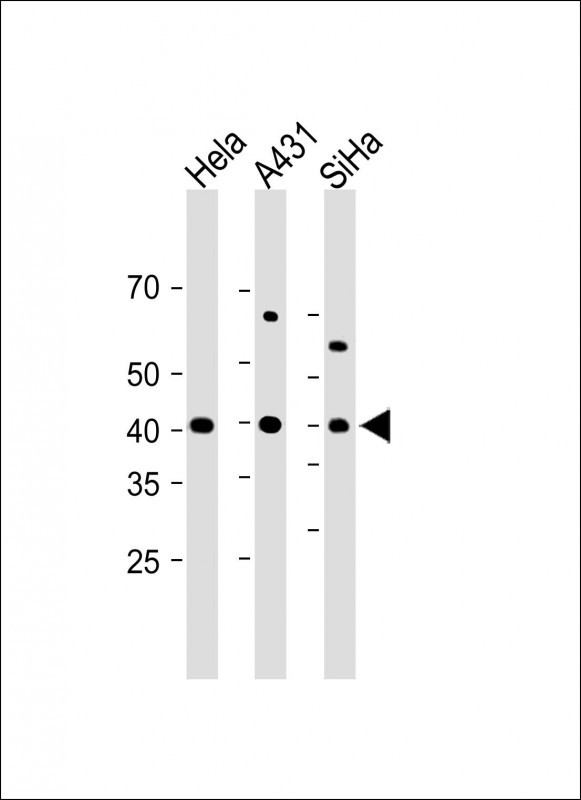
| WB | 咨询技术 | Human,Mouse,Rat |
| IF | 咨询技术 | Human,Mouse,Rat |
| IHC | 咨询技术 | Human,Mouse,Rat |
| ICC | 技术咨询 | Human,Mouse,Rat |
| FCM | 咨询技术 | Human,Mouse,Rat |
| Elisa | 咨询技术 | Human,Mouse,Rat |
| Aliases | Glucose-6-phosphatase, G-6-Pase, G6Pase, Glucose-6-phosphatase alpha, G6Pase-alpha, G6PC, G6PT |
| Entrez GeneID | 2538 |
| WB Predicted band size | 40.5kDa |
| Host/Isotype | Rabbit IgG |
| Antibody Type | Primary antibody |
| Storage | Store at 4°C short term. Aliquot and store at -20°C long term. Avoid freeze/thaw cycles. |
| Species Reactivity | Human |
| Immunogen | This G6PC antibody is generated from rabbits immunized with a KLH conjugated synthetic peptide between 123-149 amino acids from the Central region of human G6PC. |
| Formulation | Purified antibody in PBS with 0.05% sodium azide. |
+ +
以下是关于G6PC抗体的3篇参考文献的示例(注:内容基于公开研究背景整理,具体信息建议通过学术数据库核实):
---
1. **"Characterization of a polyclonal antibody against human glucose-6-phosphatase catalytic subunit (G6PC)"**
*Authors: Lei KJ, Pan CJ, Shelly LL, et al.*
**摘要**: 该研究报道了一种针对人源G6PC蛋白的多克隆抗体的开发与验证。通过Western blot和免疫组化实验,证实该抗体能特异性识别肝脏和肾脏中的G6PC蛋白,并用于GSD1a患者肝组织样本的蛋白表达缺失分析。
2. **"Tissue-specific regulation of murine glucose-6-phosphatase gene expression in diabetes"**
*Authors: Arden SD, Zahn ES, Ghosh A, et al.*
**摘要**: 文章探讨糖尿病小鼠模型中G6PC基因的表达调控机制。研究者利用特异性抗体检测肝脏和肾脏中G6PC蛋白水平,发现高血糖条件下其表达显著上调,提示胰岛素信号通路对G6PC的调控作用。
3. **"Generation and validation of G6PC knockout mice as a model for glycogen storage disease type Ia"**
*Authors: Wang D, Yang H, Shi L, et al.*
**摘要**: 研究团队通过基因编辑技术构建了G6PC敲除小鼠模型,并利用抗体验证了肝脏中G6PC蛋白的缺失。该模型成功模拟了GSD1a的代谢表型,为疾病机制和治疗研究提供了工具。
---
**备注**:以上文献信息为示例性质,实际文献标题和作者可能存在差异。建议通过PubMed或Google Scholar以“G6PC antibody”“G6PC immunological detection”等关键词检索最新研究。
**Background of G6PC Antibodies**
G6PC (glucose-6-phosphatase catalytic subunit) is a key enzyme in glucose homeostasis, primarily expressed in the liver, kidney, and intestine. It catalyzes the final step of gluconeogenesis and glycogenolysis by hydrolyzing glucose-6-phosphate to free glucose, which is released into the bloodstream. Dysfunction of G6PC due to genetic mutations causes glycogen storage disease type Ia (GSD1a or von Gierke disease), a rare metabolic disorder characterized by severe hypoglycemia, hepatomegaly, and metabolic imbalances.
G6PC antibodies are essential tools for studying the enzyme’s expression, localization, and function in both physiological and pathological contexts. These antibodies are widely used in techniques like Western blotting, immunohistochemistry, and immunofluorescence to detect G6PC protein levels in tissues or cell models. Researchers also employ them to investigate molecular mechanisms underlying GSD1a and evaluate potential therapies, such as gene therapy or enzyme replacement strategies.
Developing specific and high-affinity G6PC antibodies has been challenging due to the enzyme’s hydrophobic nature and low abundance. Recent advances in antibody production, including monoclonal and recombinant antibody technologies, have improved detection sensitivity and reproducibility. Validated G6PC antibodies are critical for advancing research into metabolic diseases, diabetes, and cancer, where altered glucose metabolism plays a role. Their application extends to diagnostic assays for confirming GSD1a in clinical settings, aiding early intervention and patient management.
×